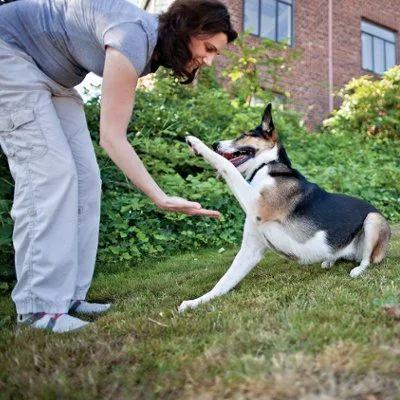The well-worn adage, “you can’t teach an old dog new tricks,” is a myth that deserves to be thoroughly debunked. Just like humans, dogs benefit immensely from continuous learning and mental stimulation throughout their lives. Far from being too old to engage, senior dogs often thrive on the focused interaction and gentle challenges that training provides. Teaching new Tricks To Teach An Old Dog not only sharpens their cognitive abilities but also strengthens the cherished bond you share, proving that age is truly just a number when it comes to canine enrichment.
The Enduring Value of Senior Dog Training
Your connection with your beloved pet needn’t diminish as they age; in fact, training can deepen it. As our dogs get older, we might naturally reduce physically strenuous activities. However, replacing these with appropriate mental and physical engagement is crucial. Teaching tricks to teach an old dog offers multiple benefits for their overall well-being:
- Mental Stimulation and Cognitive Health: Learning keeps a dog’s mind active and can help combat cognitive decline often associated with aging. Engaging in new tasks provides valuable mental exercise, helping to keep their minds sharp and focused.
- Appropriate Physical Activity: While an older dog might not be able to fetch for hours, learning gentle new movements provides suitable physical exercise. It replaces high-impact activities with controlled, lower-stress actions that are beneficial for joint health and muscle tone.
- Strengthening Your Bond: Training sessions are dedicated quality time. They foster communication, build trust, and reinforce the special connection between you and your dog. This shared experience is tremendously rewarding for both of you, promoting better behavior and understanding. It’s truly one of the most rewarding things you can teach your dog.
The beauty of training senior dogs is that it’s a non-stressful, fun activity focused on engagement rather than perfection. Even if you’ve never trained your dog before, it’s never too late to start teaching a new trick and rekindle that spark in their eyes.
Adapting Your Approach: Considerations for Training Older Dogs
When selecting tricks to teach an old dog, it’s essential to consider their individual physical and mental capabilities. Many age-related issues can be managed or treated with veterinary care, so always consult your vet about any concerns.
Addressing Physical Limitations
Older dogs may experience conditions like arthritis, joint pain, or muscle weakness, which can make certain movements uncomfortable.
- Choose Low-Impact Tricks: Avoid behaviors that require repetitive sitting, jumping, or lying down if these cause discomfort. Instead, opt for tricks that involve slower, less strenuous movements such as “speak,” “give a kiss,” or a gentle “bow.”
- Adjust for Sensory Changes: If your senior dog has developed sight or hearing problems, adapt your training cues. For hearing-impaired dogs, switch from verbal commands to clear hand signals. For vision-impaired dogs, use touch cues and verbal commands, keeping the training area consistent and safe. Remember, these adjustments allow you to continue teaching a dog a new trick effectively.
Understanding Cognitive Changes
Some older dogs may develop cognitive dysfunction, leading to behavioral changes like forgetting learned behaviors, increased anxiety, or disrupted sleep patterns.
- Patience and Compassion: These are your most valuable tools. Training can still be beneficial, but approach sessions with extra understanding and flexibility. Keep sessions short, positive, and free of pressure.
- Veterinary Consultation: Many cognitive issues can be managed with medication, diet, or supplements. Your veterinarian can advise on how training might complement a broader treatment plan. The time you invest in training will be thoroughly enjoyed by your older pet, fostering a stronger bond and improving their quality of life. Exploring different things to train your dog can be a great starting point.
Engaging Tricks to Teach Your Old Dog
The goal isn’t necessarily to have your dog perform complex routines, but to enjoy the learning process and interaction. Simple tricks to teach an old dog can provide immense satisfaction and mental stimulation. Here are some ideas:
- Speak: A fantastic mental exercise that requires minimal physical effort.
- High Five or Wave: Gentle paw movements that many senior dogs can easily manage.
- Bow: Encourages a gentle stretch, good for flexibility without strain.
- Kiss: A simple, affectionate trick that strengthens your bond.
- Hold a Sign or Object: Great for mental focus and adorable photo opportunities.
- Cover Up with a Blanket: Involves mental processing and gentle body movement, often calming.
- Get Your Leash/Toy: A practical trick that engages their mind and can be very useful.
- Push a Ball: Encourages gentle interaction with an object, good for dogs with mobility issues.
- Walk Backwards: A fun challenge that works different muscle groups gently.
 Senior dog paw shaking with a person's hand, illustrating a learned trick
Senior dog paw shaking with a person's hand, illustrating a learned trick
Remember, you can adapt virtually any trick to suit your dog’s capabilities. The most important aspect is the joy of discovery and shared activity. Focusing on things you can train a dog to do will keep them engaged and happy.
Conclusion
The notion that you can’t teach an old dog new tricks is definitively false. Senior dogs possess an incredible capacity for learning, connection, and joy. By considering their individual needs and adapting your training approach, you can provide invaluable mental stimulation, appropriate physical activity, and deepen the bond you share. Don’t let age be a barrier; embark on a new training adventure with your senior companion today and witness the enduring spark of learning in their eyes. The rewards, for both of you, will be immeasurable.
Sources
This article is based on the expert insights of Michelle Mullins, KPA-CTP, CPDT-KA, a Professional Trainer and PetSafe® Trainer & Educator.
